
Question Number 206833 by BaliramKumar last updated on 27/Apr/24
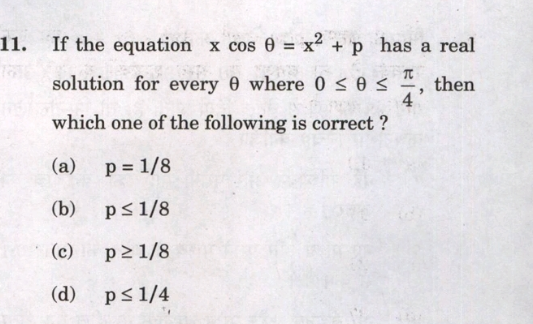
Answered by MATHEMATICSAM last updated on 27/Apr/24
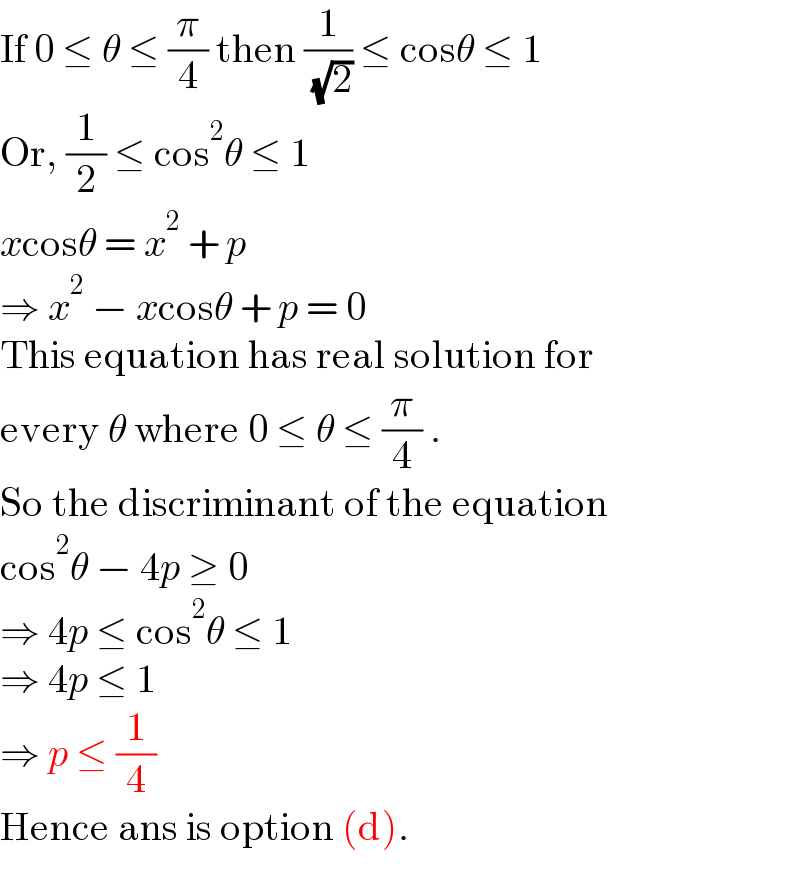
$$\mathrm{If}\:\mathrm{0}\:\leq\:\theta\:\leq\:\frac{\pi}{\mathrm{4}}\:\mathrm{then}\:\frac{\mathrm{1}}{\:\sqrt{\mathrm{2}}}\:\leq\:\mathrm{cos}\theta\:\leq\:\mathrm{1}\: \\ $$$$\mathrm{Or},\:\frac{\mathrm{1}}{\mathrm{2}}\:\leq\:\mathrm{cos}^{\mathrm{2}} \theta\:\leq\:\mathrm{1} \\ $$$${x}\mathrm{cos}\theta\:=\:{x}^{\mathrm{2}} \:+\:{p} \\ $$$$\Rightarrow\:{x}^{\mathrm{2}} \:−\:{x}\mathrm{cos}\theta\:+\:{p}\:=\:\mathrm{0} \\ $$$$\mathrm{This}\:\mathrm{equation}\:\mathrm{has}\:\mathrm{real}\:\mathrm{solution}\:\mathrm{for} \\ $$$$\mathrm{every}\:\theta\:\mathrm{where}\:\mathrm{0}\:\leq\:\theta\:\leq\:\frac{\pi}{\mathrm{4}}\:. \\ $$$$\mathrm{So}\:\mathrm{the}\:\mathrm{discriminant}\:\mathrm{of}\:\mathrm{the}\:\mathrm{equation} \\ $$$$\mathrm{cos}^{\mathrm{2}} \theta\:−\:\mathrm{4}{p}\:\geq\:\mathrm{0} \\ $$$$\Rightarrow\:\mathrm{4}{p}\:\leq\:\mathrm{cos}^{\mathrm{2}} \theta\:\leq\:\mathrm{1} \\ $$$$\Rightarrow\:\mathrm{4}{p}\:\leq\:\mathrm{1} \\ $$$$\Rightarrow\:{p}\:\leq\:\frac{\mathrm{1}}{\mathrm{4}}\:\: \\ $$$$\mathrm{Hence}\:\mathrm{ans}\:\mathrm{is}\:\mathrm{option}\:\left(\mathrm{d}\right). \\ $$
Commented by A5T last updated on 27/Apr/24

$$\theta=\mathrm{30}°\:\wedge\:{p}=\frac{\mathrm{1}}{\mathrm{4}}\:{contradicts}\:{this}. \\ $$$${We}\:{can}\:{also}\:{always}\:{find}\:{a}\:\theta\:{such}\:{that}\:{cos}^{\mathrm{2}} \theta<\mathrm{4}{p} \\ $$$${when}\:{p}>\frac{\mathrm{1}}{\mathrm{8}}. \\ $$
Commented by MATHEMATICSAM last updated on 27/Apr/24

$$\mathrm{I}\:\mathrm{saw}\:\mathrm{it}\:\mathrm{but}\:\mathrm{is}\:\mathrm{there}\:\mathrm{any}\:\mathrm{way}\:\mathrm{to}\:\mathrm{solve}\:\mathrm{it} \\ $$$$\mathrm{like}\:\mathrm{this}\:\mathrm{one}? \\ $$
Commented by A5T last updated on 27/Apr/24
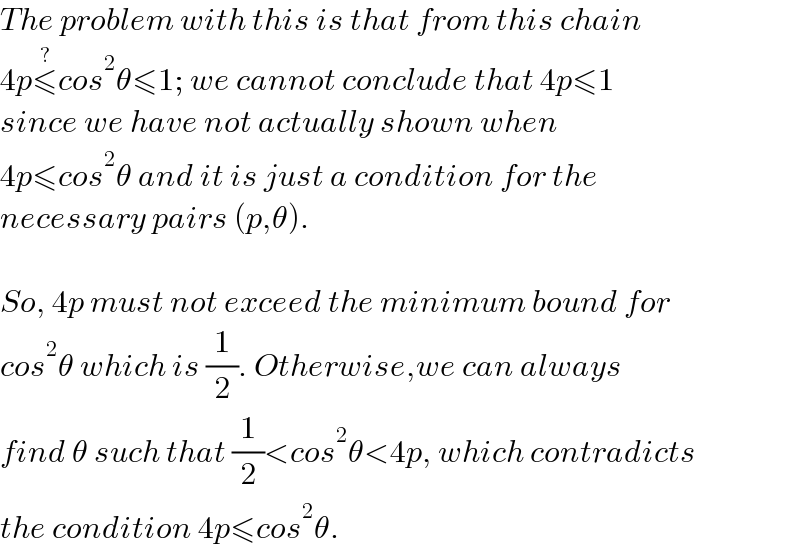
$${The}\:{problem}\:{with}\:{this}\:{is}\:{that}\:{from}\:{this}\:{chain} \\ $$$$\mathrm{4}{p}\overset{?} {\leqslant}{cos}^{\mathrm{2}} \theta\leqslant\mathrm{1};\:{we}\:{cannot}\:{conclude}\:{that}\:\mathrm{4}{p}\leqslant\mathrm{1} \\ $$$${since}\:{we}\:{have}\:{not}\:{actually}\:{shown}\:{when}\: \\ $$$$\mathrm{4}{p}\leqslant{cos}^{\mathrm{2}} \theta\:{and}\:{it}\:{is}\:{just}\:{a}\:{condition}\:{for}\:{the} \\ $$$${necessary}\:{pairs}\:\left({p},\theta\right). \\ $$$$ \\ $$$${So},\:\mathrm{4}{p}\:{must}\:{not}\:{exceed}\:{the}\:{minimum}\:{bound}\:{for} \\ $$$${cos}^{\mathrm{2}} \theta\:{which}\:{is}\:\frac{\mathrm{1}}{\mathrm{2}}.\:{Otherwise},{we}\:{can}\:{always} \\ $$$${find}\:\theta\:{such}\:{that}\:\frac{\mathrm{1}}{\mathrm{2}}<{cos}^{\mathrm{2}} \theta<\mathrm{4}{p},\:{which}\:{contradicts} \\ $$$${the}\:{condition}\:\mathrm{4}{p}\leqslant{cos}^{\mathrm{2}} \theta. \\ $$
Commented by MATHEMATICSAM last updated on 27/Apr/24

$$\mathrm{Hmm}\:\mathrm{this}\:\mathrm{is}\:\mathrm{actually}\:\mathrm{right}. \\ $$
Answered by A5T last updated on 27/Apr/24
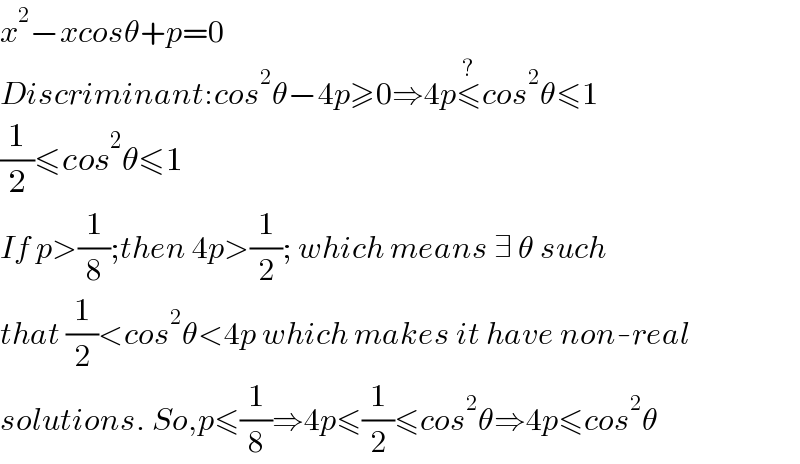
$${x}^{\mathrm{2}} −{xcos}\theta+{p}=\mathrm{0} \\ $$$${Discriminant}:{cos}^{\mathrm{2}} \theta−\mathrm{4}{p}\geqslant\mathrm{0}\Rightarrow\mathrm{4}{p}\overset{?} {\leqslant}{cos}^{\mathrm{2}} \theta\leqslant\mathrm{1} \\ $$$$\frac{\mathrm{1}}{\mathrm{2}}\leqslant{cos}^{\mathrm{2}} \theta\leqslant\mathrm{1} \\ $$$${If}\:{p}>\frac{\mathrm{1}}{\mathrm{8}};{then}\:\mathrm{4}{p}>\frac{\mathrm{1}}{\mathrm{2}};\:{which}\:{means}\:\exists\:\theta\:{such} \\ $$$${that}\:\frac{\mathrm{1}}{\mathrm{2}}<{cos}^{\mathrm{2}} \theta<\mathrm{4}{p}\:{which}\:{makes}\:{it}\:{have}\:{non}-{real} \\ $$$${solutions}.\:{So},{p}\leqslant\frac{\mathrm{1}}{\mathrm{8}}\Rightarrow\mathrm{4}{p}\leqslant\frac{\mathrm{1}}{\mathrm{2}}\leqslant{cos}^{\mathrm{2}} \theta\Rightarrow\mathrm{4}{p}\leqslant{cos}^{\mathrm{2}} \theta \\ $$
Commented by BaliramKumar last updated on 27/Apr/24

$$\mathrm{i}\:\mathrm{think}\:\mathrm{answer}\:\mathrm{will}\:\mathrm{be}\:\:\:\:\:\left(\mathrm{b}\right) \\ $$
Commented by A5T last updated on 27/Apr/24

$${How}? \\ $$
Commented by BaliramKumar last updated on 27/Apr/24

$$\theta\:=\:\mathrm{30}°\:\:\:\:\:\&\:\:\:\:\:\:\:\mathrm{p}\:=\:\frac{\mathrm{1}}{\mathrm{4}}\:\:\:\:\:\:\:\mathrm{then}\:\:\:\mathrm{roots}\:\mathrm{are}\:\mathrm{not}\:\mathrm{real}\:\:\:\:\:\:\:\:\:\:\:\: \\ $$
Commented by A5T last updated on 27/Apr/24

$${Yea}. \\ $$
Answered by Frix last updated on 27/Apr/24
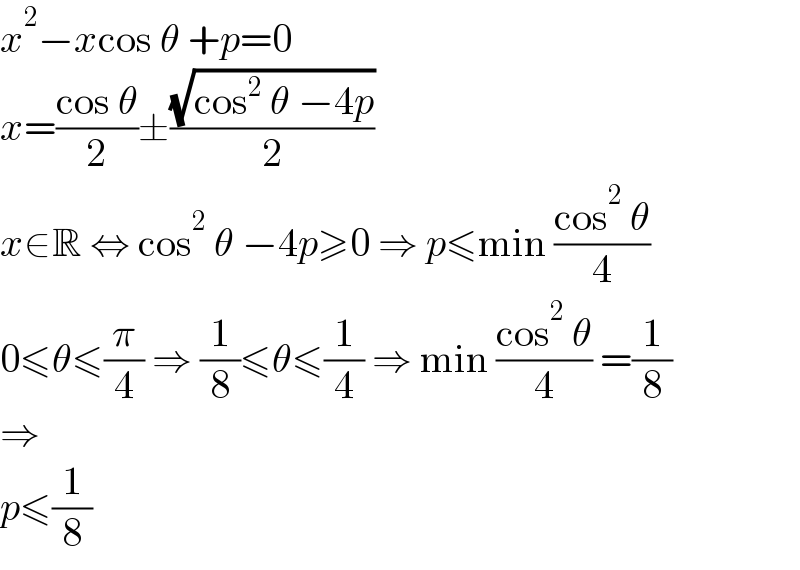
$${x}^{\mathrm{2}} −{x}\mathrm{cos}\:\theta\:+{p}=\mathrm{0} \\ $$$${x}=\frac{\mathrm{cos}\:\theta}{\mathrm{2}}\pm\frac{\sqrt{\mathrm{cos}^{\mathrm{2}} \:\theta\:−\mathrm{4}{p}}}{\mathrm{2}} \\ $$$${x}\in\mathbb{R}\:\Leftrightarrow\:\mathrm{cos}^{\mathrm{2}} \:\theta\:−\mathrm{4}{p}\geqslant\mathrm{0}\:\Rightarrow\:{p}\leqslant\mathrm{min}\:\frac{\mathrm{cos}^{\mathrm{2}} \:\theta}{\mathrm{4}} \\ $$$$\mathrm{0}\leqslant\theta\leqslant\frac{\pi}{\mathrm{4}}\:\Rightarrow\:\frac{\mathrm{1}}{\mathrm{8}}\leqslant\theta\leqslant\frac{\mathrm{1}}{\mathrm{4}}\:\Rightarrow\:\mathrm{min}\:\frac{\mathrm{cos}^{\mathrm{2}} \:\theta}{\mathrm{4}}\:=\frac{\mathrm{1}}{\mathrm{8}} \\ $$$$\Rightarrow \\ $$$${p}\leqslant\frac{\mathrm{1}}{\mathrm{8}} \\ $$
